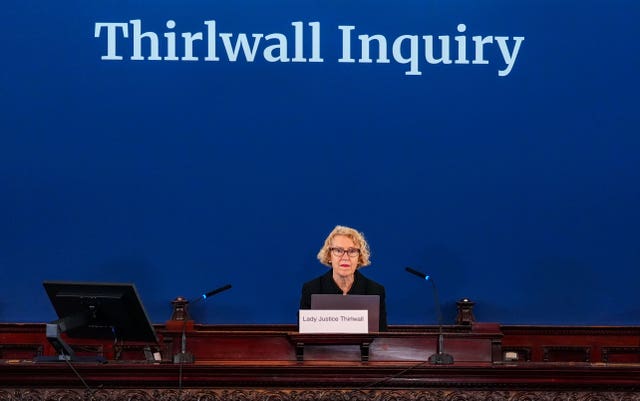CQC inspectors not told of concerns over deaths at Letby hospital, inquiry hears
During the period of the first inspection, child serial killer nurse Lucy Letby attempted to murder a baby girl.

Inspectors from a healthcare watchdog were not told of concerns about unexplained and unexpected deaths at the Countess of Chester Hospital’s neonatal unit, a public inquiry has heard.
A team from the Care Quality Commission (CQC) carried out a routine inspection of the hospital on a four-day visit in February 2016 with unannounced visits in the weeks that followed.
During the period of the first inspection, child serial killer nurse Lucy Letby attempted to murder a baby girl, Child K, as she dislodged her breathing tube in the early hours of February 17.
Earlier that month an external “thematic” review into 10 deaths on the unit in 2015 and January 2016 noted “some of the babies suddenly and unexpectedly deteriorated and there was no clear cause for the deterioration/death identified”.

It also found six babies had arrests between midnight and 4am but it concluded no common theme had been found in all the cases examined, the Thirlwall Inquiry into the events surrounding Letby’s crimes has heard.
On Thursday, CQC inspector Helen Cain said she was unaware of the review at the time of the visit.
Asked what her response would have been had she received the report, Ms Cain said: “There would have been specific questions asked about what action is being taken following identification of either a perceived or an increased rate in neonatal mortality.”
Counsel to the inquiry Craig Carr said: “You don’t focus on issues concerning neonatal mortality, you don’t ask direct questions on those areas because you were unaware of the concerns that we now know were there?”
Ms Cain said: “No.”
Mr Carr said: “There was no discussion of incidents of unexplained and unexpected deaths at all?
“No,” said Ms Cain.
Mr Carr said: “The CQC inspection did not detect the concerns that we know existed at the neonatal unit. What is your explanation for the failure to detect some of those concerns?”
Ms Cain said: “I think some of it is the data. There is always a lag with date and sources of data so I think that is a consideration. And I think very much (with) the on-site inspection you can ask a lot of open questions, a lot of general questions, but you are very much reliant on people’s responses.”

She said none of the interviewees, which included consultants and nursing managers, had raised concerns about increased neonatal mortality or unexplained and unexpected deaths.
Inspection chair Elizabeth Childs said she could not recall a discussion about unexpected and unexplained deaths and was “absolutely certain” there was no mention of any suspicion or correlation with a member of staff.
During the visit, Mrs Childs interviewed medical director Ian Harvey and director of nursing Alison Kelly, who both received copies of the thematic review.
She told the inquiry she would have asked them both “generally” if they had any serious concerns or risks around patient safety.
Counsel to the inquiry Nicholas de la Poer KC pointed out to Mrs Childs that in the months prior to the inspection at least four consultants and two nursing managers had identified or were told that Letby was associated with the unexplained spike – and the consultants had “varying degrees” of concern that association may suggest causation.
Mr De la Poer said: “The CQC did not identify any of that in the inspection.”
The witness replied: “That’s right.”
Letby, 34, from Hereford, is serving 15 whole-life orders after she was convicted at Manchester Crown Court of murdering seven infants and attempting to murder seven others, with two attempts on one of her victims, between June 2015 and June 2016.
The inquiry, sitting at Liverpool Town Hall, is expected to sit until early 2025, with findings published by late autumn of that year.





